- Home
- Umberto Eco
Baudolino Page 2
Baudolino Read online
Page 2
and as we were going and could already see the tents a company of horsemen arrived all decked out and when they see us they fall on their knees and lower their pikes and their banners and raise their swords why what can this be I asked myself and they started yelling Chaiser Kaisar here and Keiser there and Sanctissimus Rex and they kissed that gentlemans hand and my jaw almost fell off because my mouth was open so wide like an oven because it was only then I understood the gentleman with the red beard was the emperor Fridericus in flesh and blood and I had been telling him madeup stories all night like he was any old asshole
now he'll have them cut off my head I say to myself but still I cost him VII coins and if hed wanted to cut my head off he would of done it last night gratis et amoredei
et he said dont be afraid of anything its all right Im bearing news of a great Vision little puer tell us all the vision you had in the wood and I drop down like I had the falling sickness and my eyes open wide and theres foam on my mouth and I yell I saw I saw and I tell the whole storey of Saint Baudolino who made the prophecy to me and they all praise Dominnus Domine Deus and say Miraculo miraculo gottstehmirbei
and with them there were also the messengers of Terdona who hadnt yet decided whether to surrender but when they heard me they lay flat on the ground and said if even the saints were against them then they better surrender because it couldnt go on anyway
et then I saw the Derthonesi who were all coming out of the City men women and children et vetuli too and they were crying while the alamans carried them away like they were beeccie that is berbices and sheep everywhere and the people of Pavia who cheered and entered Turtona like lunnatics with faggots and hammers and clubs and picks because tearing a city down to the ground was enough to make them come
et towards evening I saw on the hill a great smoke and Terdona or Derthona was just about gone and this is how war is as my father Galiaudo says its an ugly animal war is
but better them than us
et in the evening the Emperor comes back all happy to the Tabernacula and gives me a slap on the cheek like my father never did and then he calls a gentleman who turned out to be the good canon Rahewinus and tells him he wants me to learn to write and the abacus and even gramar which then I didnt know what it was but now slowly I learn and my father Galiaudo never immagined such a thing
what a great thing to be a man of learning and who would ever have thought it
gratis agimus domini dominus I mean thanks to the Lord
all the same writing a story makes you sweat even in winter also Im afraid because the lamp has gone out and as the man said my thumb akes
2. Baudolino meets Niketas Choniates
"What's this?" Niketas asked, after he had turned the parchment over in his hands and tried to read a few lines.
"It's my first attempt at writing," Baudolino answered, "and ever since I wrote it—I was fourteen, I think, and was still a boy of the woods—I've carried it with me like an amulet. After I had filled many other parchments, sometimes day by day, I felt I was alive only because in the evening I could tell what had happened to me in the morning. Then I was content with those monthly ledgers, a few lines, to remind me of the main events. And I said to myself, when I was further on in years—now, for example—on the basis of these notes I would compose the Gesta Baudolini. So in the course of my journeys I carried with me the story of my life. But in the escape from the kingdom of Prester John..."
"Prester John? Never heard of him."
"I'll tell you more about him—maybe even too much. But as I was saying: During the escape I lost these pages. It was like losing life itself."
"You will tell me what you remember. I receive scraps of events, fragments of actions, and I extract a story from them, woven by a design of Providence. In saving my life you have given me what little future remains to me and I will repay you by giving you back the past you have lost...."
"But maybe my story has no meaning."
"There are no stories without a meaning. And I am one of those men who can find it even where others fail to see it. Afterwards the story becomes the book of the living, like a blaring trumpet that raises from the tomb those who have been dust for centuries.... Still it takes time, you have to consider the events, arrange them in order, find the connections, even the least visible ones. But we have nothing else to do; your Genoese friends say we must wait until the fury of those dogs has calmed down."
Niketas Choniates, former court orator, supreme judge of the empire, judge of the Veil, logthete of secrets or—as the Latins would have said—chancellor of the basileus of Byzantium as well as historian of many Comneni and Angelus emperors, regarded with curiosity the man facing him. Baudolino had told him that the two of them had met at Gallipoli, in the days of the emperor Frederick, but if Baudolino had been there, he had been surrounded by many other ministerials, whereas Niketas, who was negotiating in the name of the basileus, had been far more visible. Was Baudolino lying? No matter: it was he who had saved Niketas from the fury of the invaders, brought him to a safe place, reunited him with his family, and was now promising to take him out of Constantinople....
Niketas observed his rescuer. In appearance now he seemed not so much a Christian as a Saracen. Face burned by the sun, a livid scar that ran the length of his cheek, a crown of still-tawny hair, which gave him a leonine demeanor. Niketas would soon be even more amazed to learn that this man was over sixty years old. His hands were thick, when he held them clasped on his lap the gnarled knuckles were striking. Peasant's hands, made more for the spade than the sword.
And yet he spoke fluent Greek, not spitting saliva the way foreigners usually did, and Niketas had, only briefly, heard him address some of the other invaders in a hirsute language of their own, which sounded swift and harsh; this was a man who could use it offensively. For that matter Baudolino had told him the night before that he possessed a gift: he had only to hear two people speaking any language and in no time he was able to speak as they did. A singular gift, which Niketas had believed granted only to the apostles.
Living at court—and at that court—had taught Niketas to evaluate people with calm distrust. What struck him about Baudolino was that, whatever the man said, he would glance furtively at his interlocutor, as if warning him not to take him seriously. A tic admissible in anyone, except perhaps in one from whom you are expecting a truthful account, to be translated into history. But Niketas was curious by nature. He loved to listen to the stories of others, and not only concerning things unknown to him. Even things he had seen with his own eyes, when someone recounted them to him, seemed to unfold from another point of view, as if he were standing on the top of one of those mountains in ikons, and could see the stones as the apostles on the mountains saw them, and not as the faithful observer did, from below. Besides, he liked questioning the Latins, so different from the Greeks, firstly because of their totally new languages, each different from the other.
Niketas and Baudolino were seated opposite each other, in the little chamber of a tower, with double windows on three sides. One side revealed the Golden Horn and the Pera shore opposite, with the tower of Galata emerging from its procession of hamlets and hovels, from the second pair they could see the canal of the port debouching into the Strait of Saint George, and finally the third pair faced west, and from it all Constantinople should have been visible. But on this morning the delicate color of the sky was darkened by the thick smoke of the palaces and basilicas consumed by the fire.
It was the third fire to strike the city in the last nine months: the first had destroyed storehouses and the stores of the court, from the Blachernae palace to the walls of Constantine, the second had devoured all the warehouses of the Venetians, the Amalfitan merchants, the Pisans and the Jews, from Perama almost to the shore, sparing only this Genoese quarter almost at the foot of the Acropolis, and now the third fire was raging on all sides.
Down below, there was a veritable river of flame, arches were crashing to the ground, pal
aces were collapsing, columns were shattered, the fiery globes that rose from the heart of that conflagration consumed the more distant houses, then the flames that had capriciously fed that inferno returned to devour whatever they had previously spared. Above, dense clouds rose, still ruddy at their lower edge with the reflection of the fires, but of a different color, whether through a trick of the rising sun's rays or because of the nature of the spices, the lumber, or other burning material that engendered them. Further, depending on the direction of the wind, from different points in the city, aromas arrived, of nutmeg, cinnamon, pepper, and saffron, mustard or ginger—the world's most beautiful city was burning, yes, but like a brazier of scented condiments.
Baudolino had his back to the third window, and he seemed a dark shadow haloed by the double glow of the day and of the fire. Niketas half-listened to him, while at the same time his mind returned to the events of the previous days.
By now, on this morning of Wednesday, 14th of April of the year of Our Lord 1204—or six thousand seven hundred and twelve since the beginning of the world, as the date was usually calculated in Byzantium—for two days the barbarians had definitively been in possession of Constantinople. The Byzantine army, so glittering with its armor and shields and helmets when on parade, and the imperial guard of English and Danish mercenaries, armed with their awful two-edged hatchets, who until Friday had fought bravely and held off the enemy, on Friday gave way, when the enemy finally breached the walls. The victory was so sudden that the victors themselves paused, timorous, towards evening, expecting a counterattack, and to keep the defenders at bay, set the new fire. But on Tuesday morning the whole city realized that, during the night, the usurper Alexius Ducas Murzuphlus had fled inland. The citizens, now orphaned and defeated, cursed that thief of thrones whom they had fêted till the night before, just as they had flattered him when he had strangled his predecessor, and now did not know what to do. (Cowards, cowards, cowards, how shameful, Niketas lamented at the scandal of that surrender.) They had gathered in a great procession, with the patriarch and priests of every rank in ritual garb, the monks blathering about mercy, ready to sell themselves to the new potentates as they had always sold themselves to the old ones, holding up crosses and images of Our Lord, their shouts and cries loud as they moved towards the conquerors, hoping to mollify them.
What folly! To hope for mercy from those barbarians, who had no need to wait for the enemy to surrender before doing what they had been dreaming of for months: destroying the most extensive, most populous, richest, noblest city in the world, and dividing the spoils. The immense weeping procession was facing unbelievers of enraged mien, swords still red with blood, stamping horses. As if the procession had never existed, the sack began.
Dear Christ, Our Lord! What horrors and tribulations we suffered! But how and why had not the roar of the sea, the dimming or total obscuring of the sun, the moon's red halo, the movements of the stars, forewarned us of this final disaster? Thus Niketas cried, on Tuesday evening, moving with bewildered steps in what had been the capital of the last Romans, on the one hand seeking to avoid the infidel hordes, and on the other finding his path blocked by ever-new fires, in despair because he could not take the street to his house, fearing meanwhile some of that rabble might be threatening his family.
Finally, towards night, not daring to cross the gardens and the open spaces between Saint Sophia and the Hippodrome, he had run to the temple, seeing the great doors open, and never supposing that the barbarians' fury would come to profane even that place.
But just as he entered, he went white with horror. That vast space was sown with corpses, among which enemy horsemen, foul drunk, were wheeling their mounts. In the distance the rabble was shattering with clubs the silver, gold-edged gate of the tribune. The splendid gate had been bound with ropes to uproot it so it could be dragged off by a team of mules. One drunken band was cursing and prodding the animals, but their hoofs slipped on the polished floor. The soldiers, first with the flat of their swords, then with the tips, incited the poor animals, who in their fear loosed volleys of dung; some mules fell to the ground, breaking their legs, so that the whole area around the pulpit was a gruel of blood and feces.
Groups of that vanguard of the Antichrist were stubbornly attacking the altars. Niketas saw some of them rip open a tabernacle, seize the chalices, fling to the ground the sacred Hosts, using their daggers to pry loose the gems that adorned the cup, hiding them in their clothes, then throwing the chalice into a general pile, to be melted down. Snickering, some took from their saddlebags flasks filled with wine, poured it into the sacred vessel and drank, mimicking the celebrant's actions. Worse still, on the main altar, now stripped, a half-naked prostitute, drunk on liquor, danced with bare feet on the table of the Eucharist, parodying the sacred rites, while the men laughed and urged her to remove the last of her clothing; she gradually undressed, dancing before the altar the ancient and lewd dance of the cordax, until finally she threw herself, with a weary belch, on the seat of the Patriarch.
Weeping at what he saw, Niketas hurried towards the back of the temple, to the monument the pious populace called the Sweating Column—which, in fact, produced a mystical and continuous transpiration—but it was not for mystical reasons that Niketas wanted to reach it. Halfway there, he found his path blocked by two enormous invaders—to him they seemed giants—who were shouting at him in an imperious tone. It was not necessary to know their language to understand that his courtier's dress had led them to presume he was laden with gold, or else could tell them where gold was hidden. At that moment Niketas felt he was doomed because, as he had already seen in his breathless race through the streets of the invaded city, it was not enough to show that you were carrying only a few coins, or to deny having a treasure hidden somewhere: dishonored nobles, weeping old gentlemen, dispossessed possessors were tortured to make them reveal where they had hidden their wealth, and killed if, now having none, they were unable to reveal it, and left on the ground when they did reveal it, after having undergone so many and such terrible tortures that, in any event, they died while their tormentors lifted a stone, broke through a fake wall, knocked down a false ceiling, and rummaged with rapacious hands amid precious vessels, soft silks and velvets, stroking furs, sifting gems and jewels through their fingers, sniffing pots and sacks of rare spices.
So Niketas saw himself dead, mourned the family he had lost, and asked God Almighty to forgive him his sins. And it was at that moment that into Saint Sophia came Baudolino.
He appeared as handsome as Saladin, on a bedecked horse, a great red cross on his chest, sword drawn, shouting "Gods belly! By the Virgin! 'sdeath! Filthy blasphemers, simonist pigs! Is this any way to treat the things of Our Lord?" and then he flattened all those profaners red-crossed like himself, but with the difference that he was enraged, not drunk. Reaching the whore sprawled on the patriarchal seat, he bent over, grabbed her by the hair, and began dragging her in the mules' dung, shouting at her horrible things about the mother who had borne her. Around him, all those whom he intended to punish were either so drunk or so intent on removing gems from every object holding any that they were unaware of what he was doing.
Doing it, he arrived at the two giants who were about to torture Niketas. He looked at the wretched man pleading for mercy, let go of the prostitute's hair, and, as she fell, now lamed, to the ground, said, in excellent Greek: "By all twelve of the Magi! Why, you are Master Niketas, minister of the basileus! What can I do for you?"
"Brother in Christ, whoever you may be," Niketas cried, "free me from these Latin barbarians who want me dead, save my body and you will save my soul!" Of this exchange of Oriental vocalism, the two Latin pilgrims had understood little and they sought an explanation from Baudolino, who seemed one of their company, expressing themselves in Provençal. And in excellent Provençal, Baudolino shouted that this man was the prisoner of Count Baudoin of Flanders, at whose command he was seeking him, and per arcana imperii that two miserable sergea
nts like themselves would never understand. The two were stunned for a moment, then decided that arguing would only be a waste of time when they could seek other treasures without any effort, and they went off towards the main altar.
Niketas did not bend to kiss the feet of his savior. He was already on the ground, and too distraught to behave with the dignity his rank required. "O my good lord, thank you for your aid. This means that not all Latins are wild beasts with faces distorted by hatred! Not even the Saracens acted this way when they reconquered Jerusalem, when Saladin was content with a handful of coins to guarantee the safety of the inhabitants. How shameful for all Christendom, brothers against armed brothers, pilgrims who were to recover the Holy Sepulcher but have allowed themselves to be halted by greed and envy, and are destroying the Roman empire! O Constantinople, Constantinople! Mother of churches, princess of religion, guide of perfect opinions, nurse of all learning, now you have drunk from the hand of God the cup of fury, and burned in a fire far greater than that which burned the Pentapolis! What envious and implacable demons have poured down on you the intemperance of their intoxication, what mad and odious Suitors have lighted your nuptial torch? O mother, once clad in gold and imperial purple, now befouled and haggard. And robbed of your children, like birds imprisoned in a cage, we cannot find the way to leave this city that was ours, nor the strength to remain here, but instead, sealed within many errors, we roam like vagrant stars!"
"Master Niketas," Baudolino said, "I have been told that you Greeks talk too much and about everything, but I didn't believe it went this far. At the moment, the question is how to move our ass out of here. I can offer you safety in the Genoese quarter, but you have to tell me the fastest and most secure route to the Neorion, because this cross on my chest protects me but not you. The people here have all lost their reason; if they see me with a Greek prisoner they'll think he has some value and they'll take him away from me."

 Baudolino
Baudolino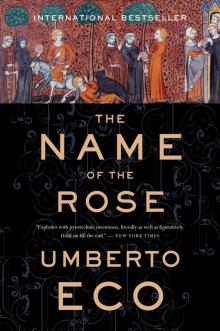 The Name of the Rose
The Name of the Rose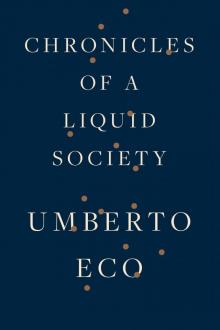 Chronicles of a Liquid Society
Chronicles of a Liquid Society Inventing the Enemy: Essays
Inventing the Enemy: Essays Foucault's Pendulum
Foucault's Pendulum How to Travel With a Salmon & Other Essays
How to Travel With a Salmon & Other Essays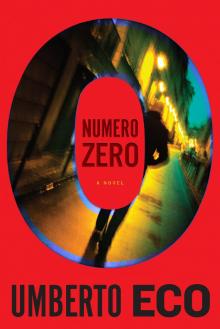 Numero zero
Numero zero The Island of the Day Before
The Island of the Day Before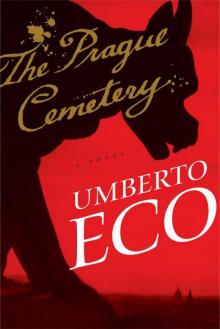 UMBERTO ECO : THE PRAGUE CEMETERY
UMBERTO ECO : THE PRAGUE CEMETERY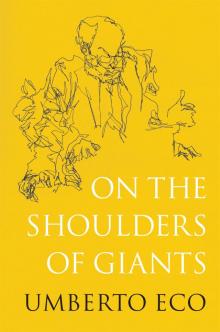 On the Shoulders of Giants
On the Shoulders of Giants Misreadings
Misreadings Six Walks in the Fictional Woods
Six Walks in the Fictional Woods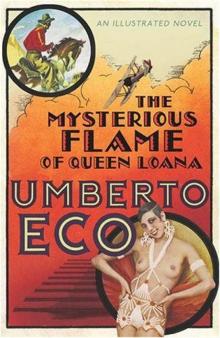 The Mysterious Flame Of Queen Loana
The Mysterious Flame Of Queen Loana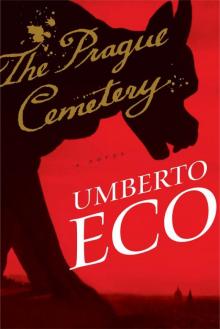 The Prague Cemetery
The Prague Cemetery On Literature
On Literature Lost structure
Lost structure